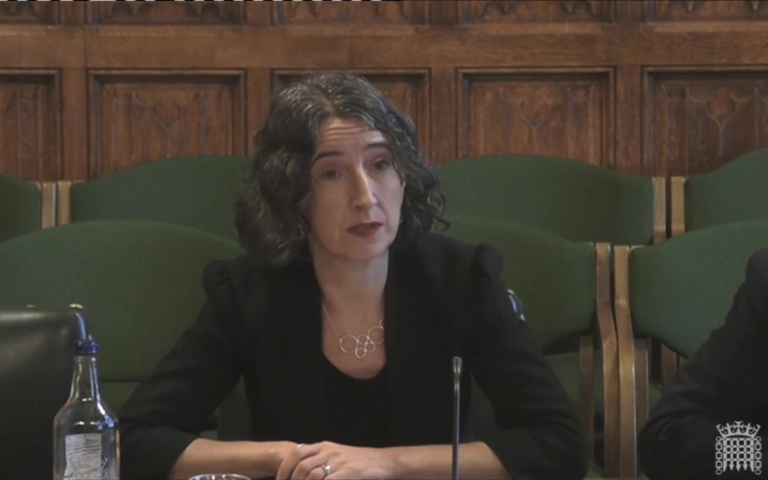Meg Russell gives oral evidence to PACAC on the membership of the House of Lords
30 November 2023
The Constitution Unit's Director, Meg Russell, gave oral evidence to the House of Commons Public Administration and Constitutional Affairs Committee on the membership of the House of Lords.

The Director of the Constitution Unit, Professor Meg Russell, gave oral evidence to the House of Commons Public Administration and Constitutional Affairs Committee (PACAC) on 28 November. She appeared alongside fellow constitutional expert Professor the Lord (Philip) Norton of Louth.
PACAC is currently examining the membership of the House of Lords. Professor Russell has long studied this area, and published a report in March outlining the options for short and long term reforms to the chamber.
Professor Russell emphasised to the committee that the nature of House of Lords membership strongly affects its ability to carry out its functions. On the one hand, ministers facing experts who have long been working in the field can find it a very challenging environment. The fact that so many members do not take the whip also means that Lords debates must be based on persuasion and evidence, not party point-scoring.
However, the ability of the House of Lords to do its job is increasingly compromised by other aspects of its composition: namely, that it is too large and that peers are appointed by a process that the public does not have faith in. Professor Russell argued that this weakens the House of Lords, parliament, and politics as a whole.
Constitution Unit research in 2022 saw 65% of respondents to a large-scale survey say that the number of members of the House of Lords should be capped at the same number of MPs, currently 650, against just 3% who opposed a cap. Likewise, 58% of respondents said that an independent body should appoint members, while just 6% thought the Prime Minister should have this role, which is the case at present.
In particular, Professor Russell recommended:
- The Prime Minister’s unlimited power of patronage should end. Since 2010, 206 Conservative and 80 Labour peers (plus 134 others) have been appointed to the House of Lords. The Prime Minister’s unfettered choice of who to appoint has both significantly increased the size of the chamber, and shifted the balance of power within it. This is unsustainable, as numbers would spiral upwards further if a future Labour Prime Minister sought to rebalance through additional appointments.
- There should be a cap on the size of the House of Lords. After a transition period to reach that cap, a revised system should be based on calls for nominations when vacancies arise.
- There are now strong arguments for completely removing hereditary peers from the House of Lords (rather than just phasing these members out by ending hereditary by-elections). Although many individual hereditary peers make good contributions, the continued presence of this block has harmed the reputation of parliament. Its removal would also immediately reduce the size of the chamber and help rebalance between the political parties, as the Conservatives strongly outnumber other parties among this group. A small number of the most active might be allowed to remain as life peers.
- There should be a fair formula for the allocation of seats in the House of Lords between political parties and other groups, including protection for the Crossbenchers.
- Oversight of propriety by the House of Lords Appointments Commission (HOLAC) should be extended to include some oversight of suitability, as recently suggested to the committee by HOLAC’s new chair Baroness (Ruth) Deech. As she also proposed, there should also be more transparency around appointments, with published statements from party leaders explaining why a person is suitable to serve in the House of Lords. HOLAC should also have some oversight of diversity, and its recommendations on propriety should be enforceable.
Professor Russell said that some of these reforms should ideally be underpinned by statute. However, she emphasised that this should not stand in the way of the government acting immediately, by committing to a smaller House of Lords and widening HOLAC’s responsibilities.
A full recording of Professor Russell’s appearance can be found below.
Useful links:
- Meg Russell’s report 'House of Lords reform: navigating the obstacles' from March 2023
- Meg Russell's oral evidence (HTML) / (PDF)
- Meg Russell’s written evidence (HTML) / (PDF)
- Constitution Unit research into the House of Lords
- Constitution Unit research into public opinion on House of Lords reform
- PACAC’s inquiry into the membership of the House of Lords
 Close
Close

